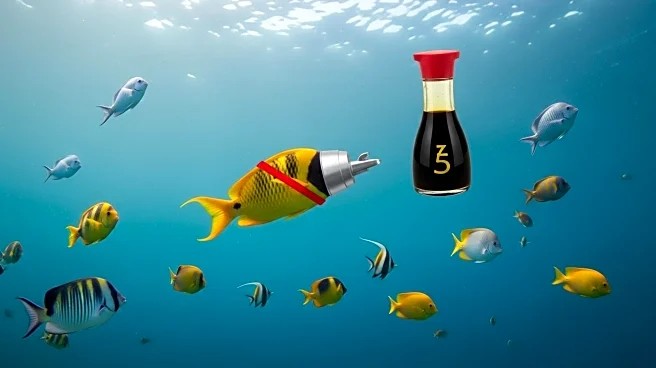What's Happening?
South Australia has become the first region globally to ban fish-shaped plastic soy sauce dispensers as part of a broader initiative to reduce single-use plastics. The ban, effective from September 1, targets the polyethylene containers known as shoyu-tai in Japan, which have been a staple in sushi takeaways worldwide since their invention in 1954 by Teruo Watanabe. The new regulation prohibits pre-filled soy sauce containers with a lid, cap, or stopper containing less than 30ml of soy sauce, while allowing plastic sachets. The South Australian government encourages the use of bulk bottles or dispensers in sushi shops to minimize waste. Dr. Susan Close, the South Australian environment minister, highlighted the environmental impact of these containers, noting their tendency to become litter due to their small size. The ban also includes other single-use plastic items like cutlery and expanded polystyrene food packaging.
Why It's Important?
The ban on fish-shaped soy sauce dispensers is a significant step in addressing plastic pollution, particularly in marine environments. These containers, often mistaken for food by marine life, contribute to the growing problem of plastic waste in oceans. By eliminating such single-use plastics, South Australia aims to reduce the volume of plastic entering the waste stream, thereby protecting marine ecosystems. The initiative reflects a growing global awareness and effort to tackle plastic pollution, setting a precedent for other regions to follow. Environmental advocates, like Cip Hamilton from the Australian Marine Conservation Society, emphasize the need for comprehensive policies that hold businesses accountable for plastic production and consumption, suggesting that this ban is a crucial but initial step towards broader environmental protection.
What's Next?
The success of South Australia's ban could inspire similar actions in other regions, potentially leading to a global reduction in single-use plastics. Environmental groups are likely to push for more stringent regulations that address plastic production and consumption on a larger scale. The government may also monitor the impact of the ban on local businesses and consumer behavior, adjusting policies as necessary to ensure effective implementation. Additionally, there could be increased advocacy for alternative packaging solutions that are environmentally friendly and sustainable.
Beyond the Headlines
The ban raises questions about the balance between convenience and environmental responsibility. It challenges businesses and consumers to rethink their reliance on single-use plastics and consider more sustainable practices. The initiative also highlights the role of government policy in driving environmental change, potentially influencing cultural attitudes towards waste and sustainability. As the world grapples with the consequences of plastic pollution, such measures could lead to long-term shifts in how societies manage resources and prioritize ecological health.









